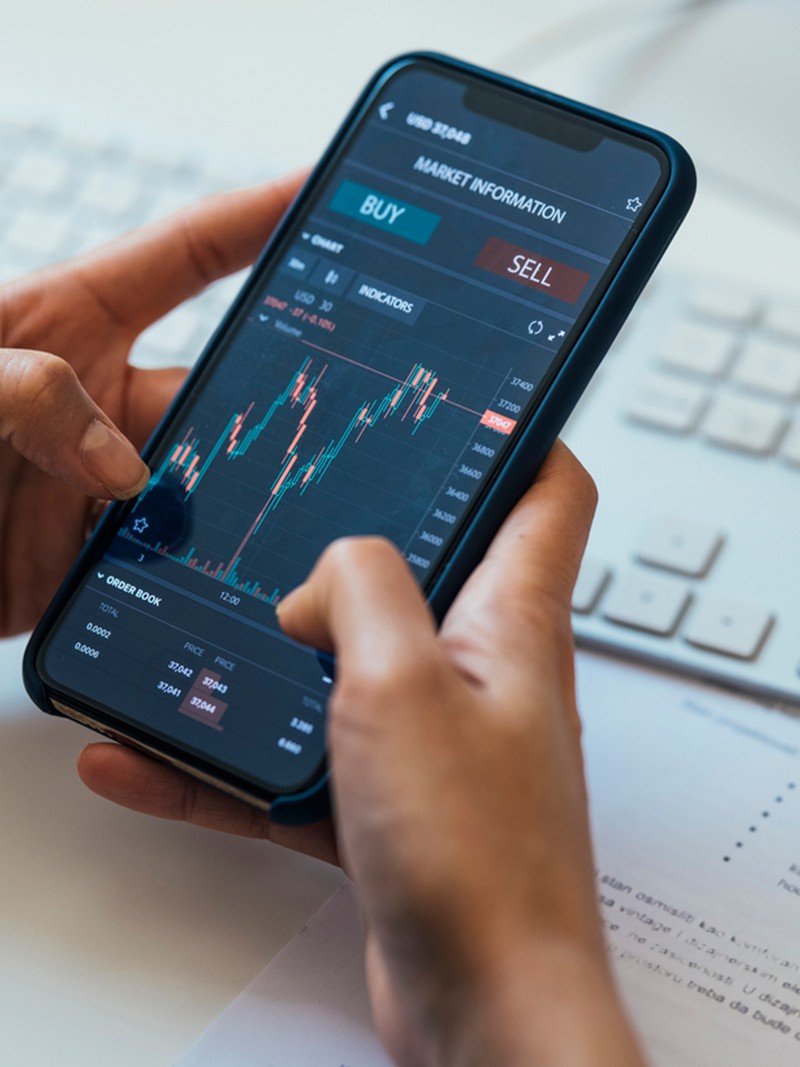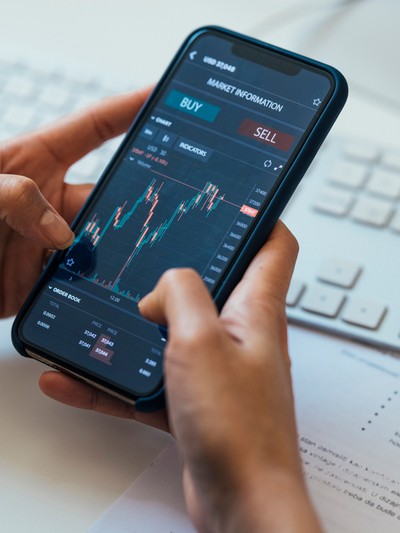

What You Need To Know About Investing
What's the first thing people should know about investing?
“That it involves risk. Understanding and managing risk is fundamental to successful investing. It's important to conduct thorough research, diversify your investments across different asset classes, and align your investment choices with your financial goals and risk tolerance. Additionally, having a long-term perspective and avoiding emotional decisions during market fluctuations are key to achieving consistent and positive results.” – Alex Brandreth, chief investment officer at Luna Investment Management
“Investing isn’t scary. It should be an important part of how you manage your money. Our research found that almost a third of women (32%) see the fear of risk as a major barrier to investing – Emma-Lou Montgomery, associate director for personal investing at Fidelity International
Why is investing better than just opening a savings account?
“Investing and opening a savings account serve different purposes and have distinct advantages and disadvantages. Whether one is better than the other depends on your financial goals, risk tolerance, and time horizon. Investing can offer the potential for higher returns compared to a savings account, and this can help beat inflation. Investing can also take advantage of compounding returns, where your earnings generate additional earnings over time. This can lead to exponential growth of your investments. Savings accounts, while safe, generally do not provide the same compounding effect due to their lower interest rates.” – Alex
“One benefit of investing over saving is you open yourself up to potential returns from the stock market. Some accounts, like a stocks and shares ISA, also mean that you don’t have to pay any income or capital gains tax on the returns you make. And this can make a real difference if you can leave the money you make invested, so it can build over time. It’s important to remember that there are risks, though. You must be comfortable leaving your money invested for the medium to long term and realise you won’t be able to access that money immediately. Finally, you must be prepared that the value of your investments can go down as well as up.” – Emma
Is it possible to reduce the risk when you invest?
“Absolutely. When you invest, you can choose the risk profile that you feel most comfortable with. And you can also spread your money across different investments (‘diversification’) so even if one area of your investments isn’t doing so well, you have other areas that probably will be.” – Emma
“There are several different asset classes that can be blended to manage risk through diversification. For example, you don’t just have to invest in the stock market – you can buy bonds which tend to be lower risk.” – Alex
Okay, so what are some of the different ways to invest your money?
“There are lots of different ways to invest. If you buy a share, you’re buying a small piece of a company. If you buy a fund, you could be buying small pieces of lots of companies in that one investment. If you’re not sure which companies to invest in, an investment fund or investment trust is a good option, as it will be run by a fund manager who picks what to invest in on your behalf.” – Emma
Is there a percentage of income you should look to invest?
“It really depends on your personal circumstances. Look at your monthly budget and work out how much you think you can afford to ‘pay yourself’ while managing your other outgoings. Small, regular amounts put away each month have the potential to build over time and remember that you can flex this month to month, depending on other financial priorities.” – Emma
“I always say start with what you feel comfortable with and can afford. If you’re speaking to a financial professional, they should be able to help look at your incomings and outgoings. No investment is entirely risk free so you should only invest money you can afford to lose.” – Alex
When is a good time to start investing?
“It’s never too early to start your investment journey. In fact, the earlier the better as it will give you more time to benefit from the potential gains of the stock market. Look at your wider financial position, make sure you have some savings, then get investing. When it comes to your financial goals, if they are more than five years away, consider investing to reach them.” – Emma
What are the market variables or shifts to be aware of?
“Regardless of how experienced you are, it is almost impossible to predict how the market is going to shift and behave. It may feel counterintuitive but staying invested through uncertain times or market shocks can often be the best approach. Try not to get distracted by the daily performance of individual investments as even the experts find it impossible to time the markets. Avoiding any kneejerk reactions and investing on a regular basis across a range of investments is the best way to protect yourself. It’s also important to have those ‘rainy day’ savings that you can easily access, if you meet any unexpected costs or need a bit of extra money quickly.” – Emma
How can you protect yourself against market shocks?
“Market shocks happen from time to time, and they tend to do so quickly and are hard to predict and prepare for. Safe-haven assets like the US dollar, gold and government bonds tend to do well during market shocks as investors seek defensive assets.” – Alex
Should you always take a long-term view – or are there short-term gains to be made?
“Taking a long-term view is generally considered a prudent approach to investing, especially for
individuals who are investing for important financial goals like retirement or building wealth over
time. Short-term gains are possible but are more uncertain, can be higher risk and more complex
than long-term investing.” – Alex
What mistakes do you sometimes see beginners make?
“Often investors may find it hard to resist the urge to tinker with their investments. It’s important to remember that too many tweaks could leave you at risk of missing unexpected opportunities that might arise from market corrections, while also posing the impossible question of when is best to buy back in. Investors can forget to diversify. Markets rise and fall, and a well-balanced portfolio is important to help ride out these market movements by investing globally and across different assets (shares, bonds, commodities, property and cash).” – Emma
“Mistakes often come down to a lack of experience and understanding. Jumping into investments without a solid understanding of the market, different asset classes, and investment strategies can lead to poor decisions. Letting emotions drive investment decisions, such as panic selling during market downturns or chasing the latest market trend, can also result in losses. Try not to look for the next big thing to ‘get rich quick’. Others try to time the market perfectly by buying at the lowest point and selling at the highest point, but that’s extremely challenging and often leads to missed opportunities and losses.” – Alex
What are three things you'd always bear in mind with investing?
“Keep an eye on the road ahead: living for today is one thing but you also have to keep an eye on the future. Are you saving and investing in line with your goals? Make time to look at your future investment goals and map these against your income and current job security, so you have a better idea of where you are today and where you need to get to. You can then use that to draw up a financial plan to do what you need to this year onwards. Second, automate your investments. Setting up a regular monthly investment that won’t leave a gaping hole in your cashflow is the best way to stay focused and on track with your goals. By adopting a positive savings habit, where you invest a small sum on a regular basis, you remove some of the worry about not saving enough (or at all) and remove the anxiety that inevitably comes with picking the ‘right’ moment to invest a larger amount. Finally, make sure you are well diversified: the ‘golden thread’ of investing – staying diversified and investing in a mix of assets, from shares and funds to bonds and cash, across different sectors and geographies – comes into its own during periods of uncertainty. You wouldn’t want all your proverbial eggs in one basket only to have that basket come a cropper. It’s far better to mix it up and spread the risk of being overly reliant on any one asset class.” – Emma
“Diversifying your investments is crucial and I also agree that investing should generally be approached with a long-term perspective. A third point would be to adapt and learn. The investment landscape evolves and economic conditions can change. It's important to stay informed about market trends, economic indicators and new investment opportunities. Continuously educate yourself and be prepared to adapt your investment strategy based on new information and changing circumstances.” – Alex
Finally, what are some easy ways to get started?
“Getting started with investing can feel overwhelming, but there are several easy and practical ways to begin. Speak to a professional, whether that be a financial advisor or wealth manager. They will help to understand your goals and put together a plan to turn this into a reality. Also, explore exchange traded funds (ETFs). These are investment funds that trade on stock exchanges, and represent a diversified collection of assets. They offer a simple way to gain exposure to various markets.” – Alex
“Opening a Stocks and Shares ISA is another good place to start. It’s as simple as opening any other savings account and many providers will allow you to open one online – you will just need your national insurance number and a few bank details. You can start a regular savings plan from as little as £25 or make a lump sum payment with a minimum of £1,000. From here, it’s about picking the investments you want. If you are new to investing, funds allow you to start smaller, spread risk, leave the investment decisions to an expert and benefit from lower fees. If you’re struggling to make a choice when picking investments to go into your ISA, remember there are ‘ready made’, low-maintenance solutions out there such as multi-asset funds which do the job of choosing the right mix of investments for you. You can invest lump sums, make regular contributions, or choose a combination of both. A lump sum gets your money invested immediately but if you worry about picking the right time to invest, as many of us do, you can drip feed your investment with a regular monthly contribution and spread it over time.” – Emma
For more information, visit LunaIM.com & Fidelity.co.uk
*DISCLAIMER: Anything written by SheerLuxe is not intended to constitute financial advice. The views expressed in this article reflect the opinions of the individuals, not the company. Always consult with an independent financial advisor or expert before making an investment or personal finance decisions. Remember, the value of your investments can go up as well as down.
DISCLAIMER: We endeavour to always credit the correct original source of every image we use. If you think a credit may be incorrect, please contact us at info@sheerluxe.com.

